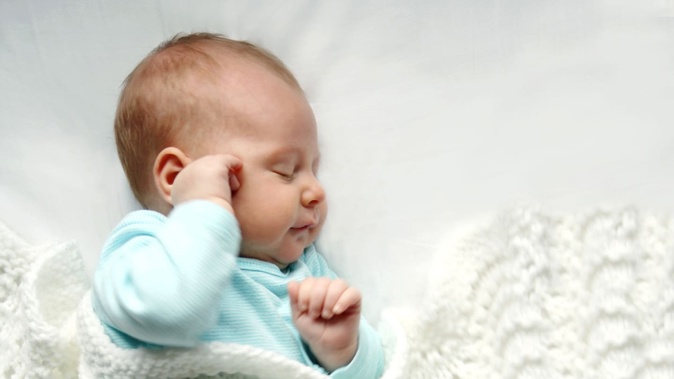
There are fears babies won’t be safe under proposed rules that could see sleeping infants checked every 15 minutes - instead of the current 10 - at early childcare centres.
The proposed changes are part of Regulations Minister David Seymour’s plan to rid the ECE sector of what he has called “excessive and confusing” regulations while making them easier to understand and comply with, and reducing regulatory burdens on centres.
Two weeks ago, the Herald reported that a baby boy had died in his sleep at an Auckland ECE centre, despite being checked every 10 minutes.
Chief adviser of the Office of Early Childhood Education, Dr Sarah Alexander said she is shocked at the proposal and leaving a sleeping infant or a group of sleeping children unattended for 15 minutes is too long.
“An infant can choke on vomit, roll over or fall out, climb out of their cot, jump out of their bunk or bed and hurt another toddler or preschooler.
“[They could] be wide awake crying their eyes out [for] 15 minutes before an adult would be required to check if they are okay.”
Alexander said she believed a teacher should stay in the same room as a sleeping child or children for the duration of their sleep.
Members of the Early Childhood Education sector have been sent a discussion document on the proposed changes.
 Regulations Minister David Seymour wants to reduce regulations in ECE centres, including potentially fewer mandated checks on sleeping infants. Photo / 123RF
Regulations Minister David Seymour wants to reduce regulations in ECE centres, including potentially fewer mandated checks on sleeping infants. Photo / 123RF
The document, Modernising Early Childhood Education in Aotearoa NZ, says “We believe the frequency of sleep checks can be safely reduced.”
It suggests children should be checked for warmth, breathing and well-being every 10 to 15 minutes, or more frequently according to individual needs.
The current wording says children should be checked every 5-10 minutes.
Concerns follow death of sleeping baby at Auckland centre
In the wake of a 5-month old baby boy dying while sleeping at a South Auckland early childhood facility in March, 2023, Dr Alexander says infant sleep regulations should be tightened, not loosened.
The baby was found unresponsive about an hour after being put down for a nap.
“His face was pale...[The staffer] picked up [the boy] and saw some vomit fall out of his mouth. She ran outside to the reception area for help,” Coroner Alexander Ho said in his report on the death.
 Dr Alexander said the death of a baby while sleeping at daycare shows that checking infants every 10 minutes is not enough. Photo / 123RF
Dr Alexander said the death of a baby while sleeping at daycare shows that checking infants every 10 minutes is not enough. Photo / 123RF
Coroner Ho ruled that the infant died from sudden unexpected death in infancy - or SUDI - as there was no apparent cause of death.
Dr Alexander said: “His death shows that checking on a sleeping baby every 10 minutes is not enough. A lot can happen in 10 minutes - in this case, a baby went from being fine to dying.”
She said she could not help but wonder if a teacher had been in the same room that day, they may have noticed something wrong and been able to save him.
 Minister for Regulation David Seymour. Photo / Mark Mitchell
Minister for Regulation David Seymour. Photo / Mark Mitchell
In a statement to the Herald, Seymour acknowledged how deeply upsetting and tragic the unexpected death of a child is for everyone involved.
“The sad thing is that as critics accept, checking more frequently than required did not save the child.
“It is wrong and insensitive to drag up a painful tragedy from years ago when the frequency of checking would not have prevented it.
“I question people trying to make political points out of traumatic incidents that happened years ago. My thoughts go out to the parents.”
Seymour said the proposal now being consulted on will be established with expertise from the Ministry of Education and people who work with children every day.
“This is the proper way to make policy that keeps young New Zealanders safe,” he said.
The Ministry of Education’s acting hautū (leader) of operations and integration, Pamela Cohen, said the consultation period will seek wide feedback in order to understand the potential impacts of the proposed changes.
“We understand that sleep monitoring is an area of significant concern and importance to the sector and families. The well-being and safety of children in ECE services remain a top priority,” Cohen said.
“We strongly encourage sector members and the public to engage in the consultation process - this is the best opportunity for their views to inform any final decisions.”
Dr Alexander said she did not see such proposed changes as modernising regulation.
“I see it as modern-day child neglect. It’s shameful that any policy-makers support ECE services to put vulnerable infant and young children in group care settings out of sight [or] out of mind for up to 15 minutes at a time.”
Vaimoana Mase is the Pasifika editor for the Herald’s Talanoa section, sharing stories from the Pacific community. She won junior reporter of the year at the then Qantas Media Awards in 2010 and won the best opinion writing award at the 2023 Voyager Media Awards.
Take your Radio, Podcasts and Music with you









